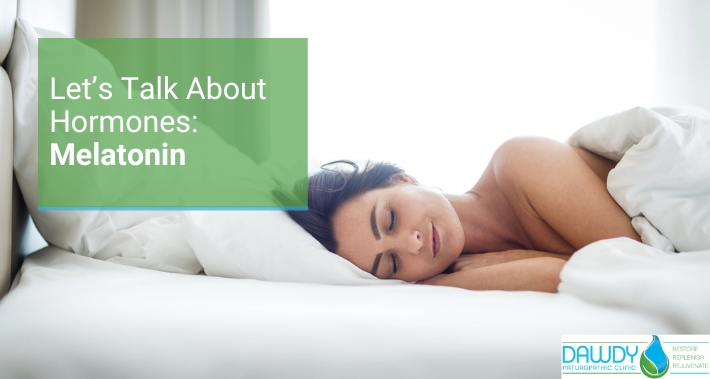Let’s Talk About Hormones: Melatonin

In a busy world filled with artificial light, it’s easy to understand why so many people have trouble sleeping.
I’m Dr. Kimberly Dawdy, a naturopathic doctor in Ottawa with a wide variety of different clinical focuses.
I’m writing this article today as a naturopath that treats insomnia, looking at ways to help you sleep better.
The key to better sleep is balancing your circadian rhythm.
And the key to balancing your circadian rhythm is melatonin.
You might recognize melatonin as a natural sleep supplement.
It’s a hormone your body produces that helps you to relax and fall asleep.
But there’s more to it than that.
Keep reading to find out more.
What Is Melatonin?
Melatonin is hormone naturally produced by your body in your pineal gland.
You can also find melatonin in other parts of your body, including your eyes, bone marrow, and stomach.
Your pineal gland is sensitive to the light, and it releases melatonin when it’s dark.
This helps you sleep.
In the morning, your adrenal glands release cortisol to help you wake up.
This is why chronic fatigue is such a common symptom of adrenal conditions.
This cycle of melatonin and cortisol is called your circadian rhythm.
This is how your body lets you know when it’s time to wake, eat, and sleep.
That’s why melatonin is known as the sleep hormone, since its main priority is helping you relax, feel tired, and sleep.
What Does Melatonin Do?
Let’s take a look at some of the different things melatonin does for you.
1. It Controls Your Circadian Rhythm
We mentioned before that melatonin helps to regulate your circadian rhythm by helping you fall asleep at night.
Your body reduces the amount of melatonin in your blood during the day to help you stay awake.
But we never explained how this works.
It’s actually related to the retinas in your eyes.
Your retina is a layer at the back of your eye that converts light from outside into electric signals in your brain.
This process allows you to see.
Your pineal gland gets its information about what time it is outside by the amount of light you see.
When it’s dark outside, or you’re in your room in the dark, your pineal gland receives signals from your retinas that it’s time to produce melatonin to help you sleep.
Of course, nature didn’t account for computers and televisions.
If you’re staring at a bright screen at midnight, your circadian rhythm won’t be as effective.
Although you can sleep without melatonin, your body will have a better quality of sleep with high levels of it in your blood.
2. It Controls Your Dopamine Levels
Melatonin also controls your dopamine levels.
It does this by binding to the receptors in your brain in order to reduce nerve activity and your dopamine levels.
This is actually a benefit, because too much dopamine at night can make it very difficult to sleep.
So, it controls your dopamine by restricting it at night to improve your quality of sleep.
3. It Controls Your Body Temperature
Melatonin helps to decrease your body temperature at night.
Although it’s not clear exactly how this works.
Either it works to drop your body’s temperature using your peripheral blood vessels, or via the hypothalamus part of your brain.
There is also a correlation between lower body temperature and an increase of melatonin in your blood.
Promoting an increase of melatonin helps to improve your quality of sleep.
More research is needed to understand this process in our bodies.
4. It Helps With Oxidative Stress
Antioxidants are molecules that help prevent oxidative stress.
For more details on that, take a look at our previous blog on the subject – What Are Antioxidants, Explained In Simple Terms.
There are a number of different antioxidants.
Vitamin C is one, and so are vitamin A, vitamin E, zinc, copper, and curcumin, the active ingredient in turmeric.
That’s just a few of them.
There are plenty of other examples.
Some are vitamins, some are minerals, and some are plant based compounds.
But only one hormone is an antioxidant – melatonin.
5. It Can Improve Certain Types Of Depression
Melatonin can help to relieve some of the sleep challenges that can often occur during particular types of depression.
Specifically, in major depressive disorder, seasonal affective disorder, and postpartum depression.
By helping to remove barriers to sleep, melatonin often helps improve other symptoms of depression as well.
What Happens If Your Melatonin Levels Are Too Low?
From what you’ve read so far, you can see how it can be tricky to sleep if you don’t have enough melatonin in your body.
But, it’s usual for you to have less melatonin in your system at night as you age.
This is considered normal.
But what actually happens if your melatonin levels are too low?
Well, chances are with low melatonin in your body, you’re not getting a high quality of sleep.
This can cause anxiety, mood disorders, a lowered basal body temperature, and immune suppression.
Not having enough melatonin is often reported in patients with dementia or Alzheimer’s disease.
Research is ongoing into the use of melatonin to treat these disorders.
Aside from sleep disruption, melatonin deficiency has also been associated with a higher risk of some cancers, and heightened symptoms of multiple sclerosis.
But the good news is that supplementing with melatonin can often help with any deficiency you have.
What Happens If Your Melatonin Levels Are Too High?
On the other hand, you can have too much of a good thing.
We don’t usually see elevated melatonin levels causing problems if it’s produced by your pineal gland.
But taking too much through supplementing is a different story.
The main symptoms of having too much melatonin are drowsiness and a lower core body temperature, along with low thyroid function, low adrenal function, and hypotension.
It can also cause headaches, nausea, and fatigue.
An elevated melatonin level is also the main symptom of seasonal affective disorder, or SAD.
This often affects people in colder climates with long hours of night during the winter – hello Ottawa!
But it can also happen in more temperate climates that have heavier cloud coverage.

Where Do You Get Melatonin?
Your body produces melatonin in your pineal gland naturally, but in addition to buying supplements, you can also get it naturally in your diet.
There is not currently a recommended dietary allowance for melatonin, both in terms of food or supplementing.
Most food databases do not indicate the amount of melatonin found in food as a result.
But, here are six good food sources of melatonin:
- Tart cherries
- Goji berries
- Milk
- Eggs
- Fish
- Nuts
How To Balance Your Melatonin Levels Naturally
Melatonin supplements are generally considered to be well tolerated.
However, there hasn’t been enough research on the long term use of supplementation.
But don’t worry, there are some useful natural strategies to help boost your body’s melatonin levels, naturally.
While it might be counterintuitive, getting sunlight when you wake up can help your body produce serotonin, which also helps keep you awake along with cortisol.
Serotonin plays a role in melatonin production, which is why getting a good amount of protected sunlight can help your body create more melatonin at night.
It can also help to eat foods high in melatonin or foods containing the amino acid tryptophan.
This amino acid helps your body produce serotonin, which then helps to produce melatonin.
Some examples of tryptophan rich food include:
- Chicken
- Turkey
- Peanuts
- Bananas
Another strategy is to limit artificial light at night to support your circadian rhythm’s production of melatonin.
You can also take a warm bath to relax and boost your melatonin levels by reducing your cortisol levels.
Book Your Appointment With Dawdy Naturopathic Today
Are you having trouble sleeping?
If so, it may be related to melatonin production.
As a naturopathic doctor that treats sleep issues, I can help get your slumber back on track.
Book your appointment with me, Dr. Kimberly Dawdy, ND, today.
Yours in Health,
Dr. Kimberly Dawdy, ND
Dawdy Naturopathic Clinic
6899 Sunset Blvd,
Greely, ON K4P 1C5
-https://g.page/dawdynaturopathicclinic
Dawdy Naturopathic Clinic offers a variety of naturopathic health solutions for individuals and families in Ottawa and the surrounding area.



